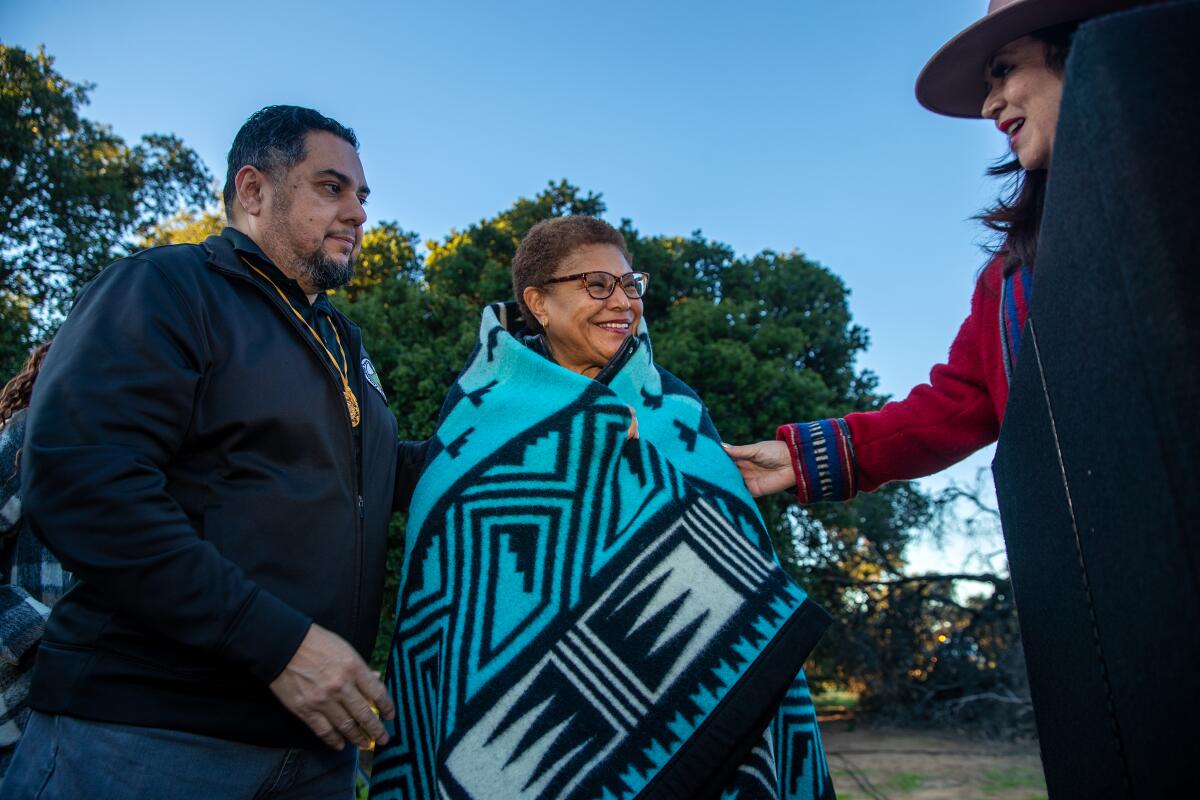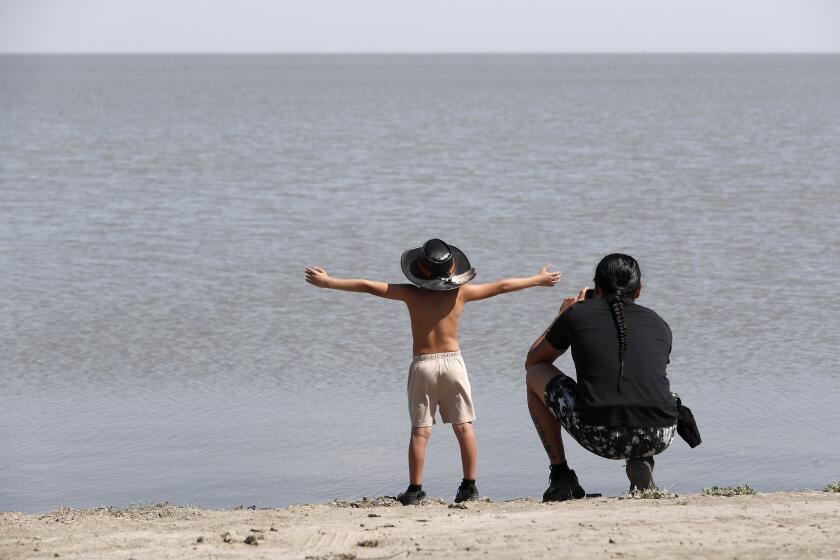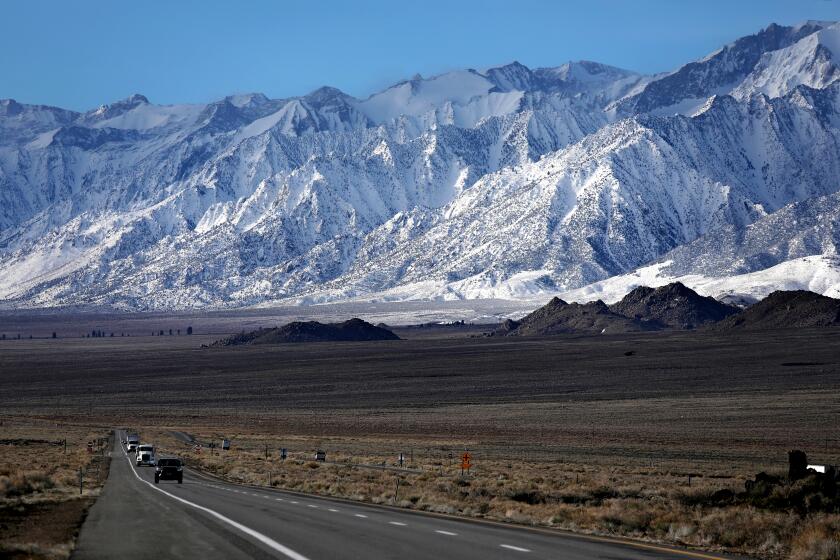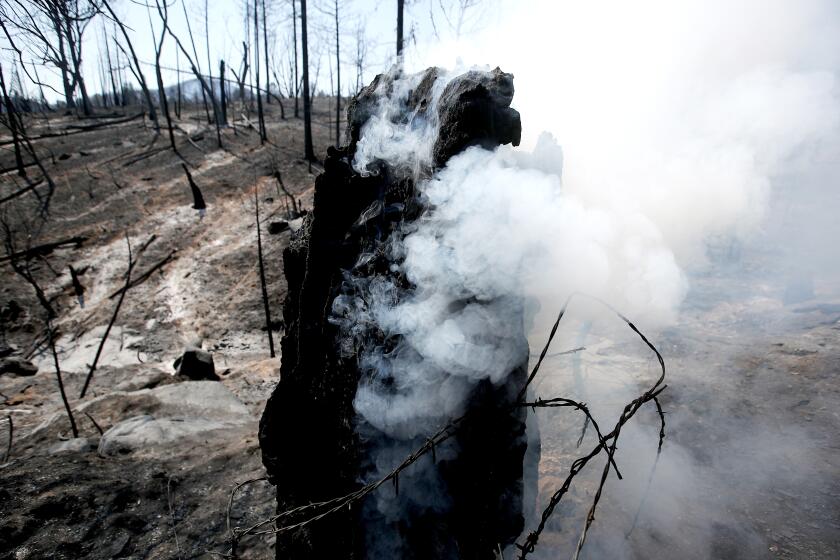L.A. mayor ousts Native American DWP commissioner; Indigenous groups outraged

- Share via
Cynthia Ruiz, the first Native American ever to serve on the Los Angeles Board of Water and Power Commissioners, got some bad news from City Hall recently.
Ruiz said a deputy mayor called her on May 26 to say she was being removed after serving just one year on the panel that oversees the Department of Water and Power.
“It’s not about you,” Ruiz said she was told. “If you want to go on to a different commission, let me know and I can make it happen.”
What followed was a moment of shock and uncomfortable silence, Ruiz said. The former head of the city’s multibillion-dollar retirement fund system believed she was making progress in easing 122 years of tension between the DWP and Owens Valley tribes over water rights and land use in the eastern Sierra Nevada watershed.
The one-two punch was thrown an hour later via an email from Mayor Karen Bass. It said Ruiz’s appointment would end on July 5, “or at the time your successor is confirmed by the City Council, whichever comes first.”
The Tachi Yokut Tribe is celebrating the return of California’s Tulare Lake, saying water should remain to heal an ecosystem that was drained for agriculture.
The mayor’s decision to bench Ruiz — a lifelong Angeleno and member of the Cherokee Nation — has sparked anger and resentment among tribal leaders and others who saw Ruiz’s appointment as a significant advancement in the city’s recognition of Indigenous voices. Her abrupt departure has left some feeling betrayed.
“We are in shock that Cynthia, the first Native American to serve on that commission, was replaced by a white man when she was not even a full year into her four-year term,” said Teri Red Owl, executive director of the Owens Valley Indian Water Commission. “For Native Americans, the manner in which Ruiz was replaced was a slap in the face.”
In a recent letter to Bass, Anthony Redblood Morales, chairman and chief of the Gabrieleno/Tongva San Gabriel Band of Mission Indians, said Bass’ action was “insulting and reverts progress made to advance underrepresented minorities, specifically Native Americans.”
“It’s another example of how our people have been disrespected, disregarded and ignored,” he said.
Water and Power commissioners serve at the pleasure of the mayor and are charged with overseeing the nation’s largest city-owned utility, which has an annual budget of about $7 billion and employs some 11,000 people. In addition to setting policy, commissioners determine the size of monthly water and power bills for 4 million residents.
The man Bass nominated to replace Ruiz — George McGraw — was confirmed by the City Council on June 20. McGraw describes himself as “a leading queer voice in social entrepreneurship, environmental justice, and water,” and is the founder and chief executive of DigDeep, a nonprofit that works to bring clean water to communities that lack access.
Asked for comment on the decision to replace Ruiz, Zach Seidl, a spokesman for Bass, said, “Transitions at the beginning of a mayoral administration are common — Commissioner Ruiz’s transition was one of 110 to have occurred in the first 100 days of the Bass administration.”
Seidl said senior staff members from the mayor’s office had met with tribal leaders recently “to speak about issues that most impact their communities, and to plan a convening with the mayor in the coming weeks.”
The skeletal remains of more than 30 Native Americans have been unearthed at a Caltrans worksite in the Owens Valley. Tribes want the work to stop.
Tribal leaders contacted by The Times said they were cautiously optimistic about the results of that meeting; however, they and the nonprofit Owens Valley Committee are demanding that Bass add a Native American to the commission as quickly as possible.
They have also recommended a candidate for the next available open seat: Cheri Thomas, the Los Angeles Unified School District’s principal administrative analyst and a member of the Pacific Northwest coast’s Quinault Indian Nation.
A push to return Ruiz to the post was out of the question. “I didn’t want to fight to stay,” Ruiz said. “But Native American representation on that commission is critical.”
The history between the DWP and tribes in the Owens Valley has been characterized by controversy and strife over water rights and land use.
In the early 1900s, Los Angeles agents quietly bought up ranch lands and water rights in the region for an aqueduct to meet the growing demands of the metropolis 200 miles to the south.
The city diverted so much water from the Owens River via the aqueduct that the 110-square-mile Owens Lake dried up, severely altering the landscape of what had been a kingdom of irrigated villages and plentiful game for Paiute tribes since time immemorial.
In 1924, Paiute-Shoshone Indians staged a five-day armed resistance known as the Battle of Little Lake. They were protesting the diversion of water and encroachment on their lands.
Their efforts were unsuccessful. But since then, the relationship has remained strained between the DWP and tribes including the Lone Pine Paiute Shoshone Tribe, the Fort Independence Indian Community of Paiute Indians, the Big Pine Paiute Tribe of Owens Valley, the Bishop Paiute Tribe, the Timbisha Shoshone Tribe and the Mono Lake Kutzadika Tribe.
Ruiz, her supports say, had taken steps to heal that division.
Ruiz worked to support the sale of 10 acres of DWP land to the Bishop Paiute Tribe for use as a tribal cemetery, moving the project past bureaucratic hurdles toward a purchase agreement under consideration by tribal leaders.
Members of the Southern Sierra Miwuk Nation became the latest Indigenous tribe to watch homes burn despite knowing it could have been avoided.
“Our relationship with Cynthia was sincere and authentic,” said Meryl Picard, chairwoman of the tribe. “It was important for us to be dealing with another Native American who understood the trauma of our history.”
Ruiz’s duties included introducing the newly elected Bass to crowds at Native American events such as a winter solstice ceremony held in a glade of century-old oaks at the Chatsworth Nature Preserve on Dec. 21.
Ruiz and Rudy Ortega, president of the Fernandeno Tataviam Band of Mission Indians, marked the winter solstice, also known as the “shortest day and longest night of the year,” by draping a turquoise blanket on Bass’ shoulders.
Disappointment was etched across Ruiz’s face when her removal was formally announced at the June 13 commission meeting, followed by praise for her contributions.
“I really thought I had longer here — the year went by so fast and there is so much more work to be done,” Ruiz said from behind the commission dais. “But what I am a little disappointed about is losing the Native American voice.
“I’ve tried to be the Native voice,” she said, “because we know that LADWP history has been sordid when it comes to the tribes, especially the tribes of Owens Valley.”
More to Read
Sign up for Essential California
The most important California stories and recommendations in your inbox every morning.
You may occasionally receive promotional content from the Los Angeles Times.














